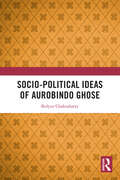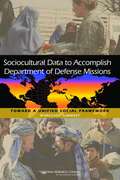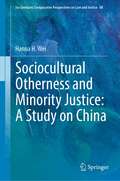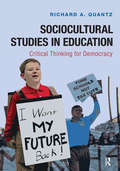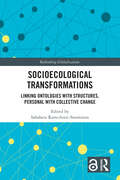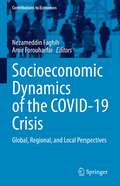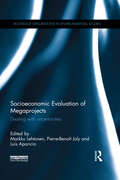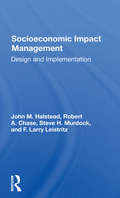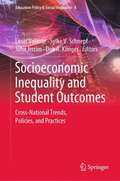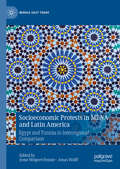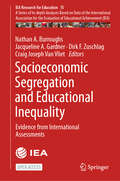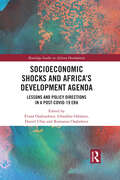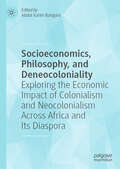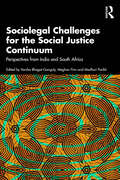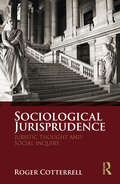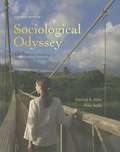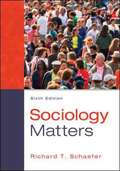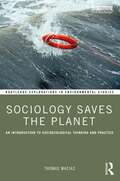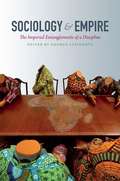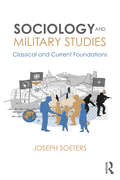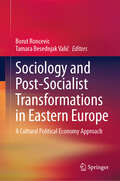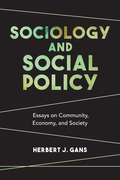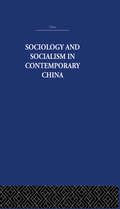- Table View
- List View
Socio-political Ideas of Aurobindo Ghose
by Bidyut ChakrabartyBy focusing on the socio-political ideas of the nationalist Aurobindo Ghosh (1872-1950), the book is an analytical dissection of his ideational vision which is still a relatively under-studied area of nationalist thoughts. During the perod, 1893-1910, Ghosh radically altered the texture of Indian nationalism by dwelling on how nationalism flourished in different parts of India, particularly, Japan, Italy and Ireland. conceptually different from the prevalent form of nationalist voice, it was he who clearly charted out a new course for anti-British campaign that fully unfolded with the appearance of Gandhi (1869-1948) on the Indian political scene. So, Aurobindo's politico-ideological vision ushered in a new era in the nationalist battle for India's political emancipation. Not only is the book therefore an intervention in the nationalist thought, but also devised new conceptual parameters for comprehending the radicalization of politico-ideological voices while simultaneously mobilizing those who were ready to make supreme sacrifices for the cause.
Sociocultural Data to Accomplish Department of Defense Missions: Toward a Unified Social Framework
by National Research Council of the National AcademiesSociocultural Data to Accomplish Department of Defense Missions: Toward a Unified Social Framework summarizes presentations and discussions that took place on August 16-17, 2010, at a National Research Council public workshop sponsored by the Office of Naval Research. The workshop addressed the variables and complex interaction of social and cultural factors that influence human behavior, focusing on potential applications to the full spectrum of military operations. The workshop's keynote address by Major General Michael T. Flynn, U.S. Army, provided critical context about the cultural situation and needs of the military operating in Afghanistan. Additional presentations were divided into four panels to address the diverse missions encountered by the U.S. military worldwide. The workshop concluded with a final panel to discuss the strengths and weaknesses of different methods of acquiring and using relevant data and knowledge to accomplish these missions. The panel topics and presenters are listed below: Conflict Is Local: Mapping the Sociocultural Terrain David Kennedy, Hsinchun Chen, and Kerry Patton Bridging Sociocultural Gaps in Cooperative Relationships Robert Rubinstein, Alan Fiske, and Donal Carbaugh Building Partner Capacity with Sociocultural Awareness Jeffrey Sanchez-Burks and Shinobu Kitayama The Art of Sociocultural Persuasion Jeanne Brett, James Dillard, and Brant R. Burleson Tools, Methods, Frameworks, and Models Mark Bevir, Laura A. McNamara, Robert G. Sargent, and Jessica Glicken Turnley
Sociocultural Otherness and Minority Justice: A Study on China (Ius Gentium: Comparative Perspectives on Law and Justice #88)
by Hanna H. WeiThis book draws attention to the nonlegal, sociocultural aspects of justice for minorities in China. The primary objectives are threefold. The first is to present a tentative analysis of the lived realities of being ‘the other’ in China, with the aim of presenting a critical picture of the complex national context and identifying main concerns and key challenges. Six topics are covered - gender roles, health, class, intimacy, ethnicity and religion, and expression. The second objective is to explore the interaction between a wide range of factors and myriad systems that enable or hinder protection and justice for these groups, be they historical, political, social, or cultural, hoping to open up a rich domain of inquiry for those interested in to what extent and in what ways otherness may or may not survive in China. The third objective is to bring attention to new trends and developments, some are easily identifiable whereas others are less detectable, some are interrelated while others are relatively isolated, some are straightforward and others remain easily misinterpreted.
Sociocultural Studies in Education: Critical Thinking for Democracy
by Richard A QuantzSociocultural Studies in Education: Critical Thinking for Democracy fills a void in the education of educators and citizens in a democracy. It explores some of the fundamentals around which disagreements in education arise. It presents a process with which those new to these debates can understand often confusing and entwined sets of facts and logics. This book leads the reader through some general concepts and intellectual skills that provide the basis for making sense out of the debates around public education in a democracy. This book can be seen as a primer on how to read texts about education. It acknowledges that good teachers must be not only trained to teach, but also educated about education. It presents the various themes and currents found within the arguments and narratives that people use to represent public education. It assumes that the more those interested in education know about how to see through the rhetoric, the better they will be at discerning whose interests are served by which texts.
Socioecological Transformations: Linking Ontologies with Structures, Personal with Collective Change (Rethinking Globalizations)
by Sabaheta Ramcilovic-SuominenSocioecological Transformations confronts dominant framings of transformation that either remain apolitical and ahistorical, or overemphasizes the structural causes, while bypassing the ontological roots of the present-day socioecological violence and destruction. It challenges the technocratic and structuralist tendencies that either reduce transformation to policy tweaks, or to social movements and activism. This volume reclaims socioecological transformations as a radical, justice-centred theory-praxis. By connecting the structural and the ontological roots of the colonial-racial-capitalist system of oppression, the book exposes how materialist-dualist ontology and associated worldviews uphold hierarchies of worth, which in turn serve and uphold the colonial-racial-capitalist system of oppression. In doing so, it widens the spectrum of viable responses to include in addition to social movements and activism, those that unsettle the ontological bases of our socioecological calamities—the human exceptionalism and the illusion of separation. The fifteen chapters span diverse geographies, struggles, and approaches, weaving together onto-epistemic inquiry with grounded transformative practices, movements and action. The contributions share the common focus on justice as both motivation and a guiding principle for transformations. The book calls for transformation where being, knowing, and doing are reimagined in relational, life-affirming terms. A vital resource for students, academics, activists inspired by political ecology, feminist studies, decolonial and relational approaches, social movements, and transformations, but also practitioners and policy actors seeking to engage transformation beyond surface-level solutions. Socioecological Transformations invites readers to embrace complexity, plurality, along the paradoxes that transformations entail, while building solidarities across polarized strategies, ontologies and worldviews. The Open Access version of this book, available at http://www.taylorfrancis.com, has been made available under a Creative Commons Attribution-Non Commercial-No Derivatives (CC BY-NC-ND) 4.0 license.
Socioeconomic Dynamics of the COVID-19 Crisis: Global, Regional, and Local Perspectives (Contributions to Economics)
by Nezameddin Faghih Amir ForouharfarThis book depicts and reveals the socioeconomic dynamics of the COVID-19 crisis, and its global, regional, and local perspectives. Explicitly interdisciplinary, this volume embraces a wide spectrum of topics across economics, business, public management, psychology, and public health. Written by global experts, each chapter offers a snapshot of an emerging aspect of the COVID-19 crisis for the benefit of academics and students, as well as the institutional, economic, social, and developmental policymakers and health practitioners on the ground.
Socioeconomic Evaluation of Megaprojects: Dealing with uncertainties (Routledge Explorations in Environmental Studies)
by Markku Lehtonen Pierre-Benoît Joly Luis AparicioThe governance and evaluation of ‘megaprojects’ – that is, large-scale, complex, high-stakes infrastructure projects usually commissioned by governments and delivered through partnerships between public and private organisations – is receiving increased attention. However, megaproject evaluation has hitherto largely adopted a linear-rationalist perspective to explain the frequent failure of such projects to meet the ‘iron triangle’ of performance criteria: delivering on time, within budget, and according to specifications. This approach recommends greater control and accountability to remedy megaproject ‘pathologies’. Drawing on empirical examples mainly from the transport sector and radioactive waste disposal, this book offers new perspectives to megaproject evaluation. Comprising contributions from leading experts in project evaluation and appraisal, this collection opens up new avenues by suggesting two ways of improving megaproject evaluation: 1) approaches that go beyond the dominant linearrationalist notion of policy processes, and emphasise instead the objective of opening up appraisal processes in order to enhance learning and reflexivity; and 2) approaches that extend evaluative criteria beyond the ‘iron triangle’, to cover the various socioeconomic impacts and preconditions for project success. This volume will be of great relevance to scholars and practitioners with an interest in megaprojects, energy and climate policy, radioactive waste management, urban design, and project planning and management.
Socioeconomic Impact Management: Design And Implementation
by Steve H Murdock F. Larry Leistritz John M Halstead Robert A ChaseThe authors of this book present a comprehensive analysis of impact management for such large-scale resource and industrial development projects as power plants, mines, and nuclear waste disposal facilities. An overall framework for designing an impact management program is presented and specific recommendations for implementing management measures are provided. This book is unique in that it provides a conceptual framework for choosing among alternative approaches in designing a management system, as well as offering practical guidance for implementing such systems.
Socioeconomic Inequality and Student Outcomes: Cross-National Trends, Policies, and Practices (Education Policy & Social Inequality #4)
by Louis Volante Sylke V. Schnepf John Jerrim Don A. KlingerThis book examines socioeconomic inequality and student outcomes across various Western industrialized nations and the varying success they have had in addressing achievement gaps in lower socioeconomic status student populations. It presents the national profiles of countries with notable achievement gaps within the respective school-aged student populations, explains the trajectory of achievement results in relation to both national and international large-scale assessment measures, and discusses how relevant education policies have evolved within their national contexts. Most importantly, the national profiles investigate the effectiveness of policy responses that have been adopted to close the achievement gap in lower socioeconomic status student populations. This book provides a cross-national analysis of policy approaches designed to address socioeconomic inequality.
Socioeconomic Protests in MENA and Latin America: Egypt and Tunisia in Interregional Comparison (Middle East Today)
by Irene Weipert-Fenner Jonas WolffThis edited volume presents a detailed account of the dynamics of socioeconomic contention in Egypt and Tunisia since 2011. Combining quantitative and qualitative methods, it analyses what has happened to the socioeconomic grievances that played a key role in the mass mobilizations of 2010 and 2011. The book is based on an original data set of socioeconomic protests in the two countries and on in-depth case studies that cover the two most important types of socioeconomic contention: labor protests and protests by socioeconomically disadvantaged people outside the formal economy. Drawing on a systematic review of comparative research on Latin America, the authors argue that the dynamics of socioeconomic contention in contemporary Egypt and Tunisia reflect a deep-seated crisis of popular sector incorporation. This work promises to enrich the scholarly and the political debates on Egypt and Tunisia, the MENA region and on contentious politics in times of political change.Chapter 10 of this book is available open access under a CC BY 4.0 license at link.springer.com.
Socioeconomic Segregation and Educational Inequality: Evidence from International Assessments (IEA Research for Education #15)
by Nathan A. Burroughs Jacqueline A. Gardner Dirk F. Zuschlag Craig Joseph Van VlietThis open access book uses multiple IEA Assessments to examine the relationship between socioeconomic segregation between classrooms and student outcomes. By examining Socioeconomic status (SES) segregation between classrooms as well as between schools, it produces a more accurate estimate of student sorting. Further, this study examines the differential impact of student sorting across subject areas and grades in order to explore whether school structure’s relationship to educational inequality exhibits content and longitudinal heterogeneity. This study employs time series, fixed-effect, random-effects, and synthetic-cohort methods to comprehensively investigate the robustness of the relationship between SES segregation and achievement inequalities. This project makes an important contribution to researchers’ understanding of student sorting’s impact using a comparative lens, while also providing important information to policymakers on the role of schools in mediating social inequalities.
Socioeconomic Shocks and Africa’s Development Agenda: Lessons and Policy Directions in a Post-COVID-19 Era (Routledge Studies in African Development)
by Gbadebo Odularu Evans Osabuohien Daniel Ufua Romanus OsabohienThis book investigates how African countries respond to socioeconomic shocks, drawing out lessons to help to inform future policy and development efforts. The challenges posed by the COVID-19 pandemic affected all sectors of the economy, exposing substantial structural weaknesses and complexities in supply chains and logistics across the African continent. This book examines the disruptive impact of the pandemic across Africa. However, it also goes beyond the current crisis to investigate how socioeconomic pressures in general impact commodity prices, national budgeting processes, food, business, energy sectors, education, health, and sanitation. Overall, the book presents evidence-based solutions and policy recommendations to enable readers to improve resilience and responses to future crises. The insights provided by this book will be of interest to policymakers and development agencies, as well as to researchers of global development, politics, economics, business, and African studies.
Socioeconomics, Philosophy, and Deneocoloniality: Exploring the Economic Impact of Colonialism and Neocolonialism Across Africa and Its Diaspora
by Abdul Karim BanguraExisting paradigms such as &“decoloniality&” simplify the complex dynamics between former colonies and colonial powers. Such frameworks overlook the role of local elites in maintaining and even enhancing oppressive systems. They also imply that external forces are responsible for ongoing exploitation. This book tackles this concept head on by introducing a new methodology called &“deneocoloniality.&” Deoneocoloniality expands on decoloniality and neocolonialism. It argues that, while decoloniality focuses on the residual impacts of colonialism by external forces, it neglects the internal dynamics where former colonized elites play a significant role in perpetuating oppression for personal gain. The book presents socioeconomic and philosophical case studies to support deneocoloniality as a more comprehensive framework for understanding current realities in African countries. Readers will gain a nuanced understanding of the intricate power structures affecting developing nations. The book provides a structured methodology for analyzing problems, emphasizing the importance of logical reasoning and collaborative efforts. It offers practical solutions based on deep analysis, moving beyond mere diagnosis to actionable recommendations. This approach aims to equip readers with the tools needed to develop policies and strategies that address both external and internal sources of oppression.
Sociolegal Challenges for the Social Justice Continuum: Perspectives from India and South Africa
by Varsha Bhagat-Ganguly Meghan Finn Madhuri ParikhAs legal jurisdictions in the Global South, both India and South Africa have long histories of inequality and structural oppression. This book engages in comparative sociolegal analysis to examine the contours of social justice in both countries. It explores the role of law as an instrument for social change in the face of persistent conditions of injustice, discrimination, social exclusion, and socioeconomic vulnerabilities. The book addresses newly emerging socio-legal challenges for the social justice continuum in a neoliberal era. Focusing on four key themes, it explores:· the challenges for labour law and social security including informalisation, climate change, and migrancy;· law, technology, and social justice, with a focus on the role that emerging technologies often play to ameliorate or exacerbate social exclusion;· sexual orientation, gender, and substantive equality, grappling with the disjuncture between law and lived realities; and· pedagogical approaches to legal education and social justice lawyering.Lucid and illuminating, this book will be of interest to academics, researchers, legal practitioners and social actors who are exploring legal strategies and developments to tackle comparative social justice challenges, especially in the Global South.
Sociological Debates on Gestational Surrogacy: Between Legitimation and International Abolition
by Daniela BandelliThis open access book discusses and analyses competing views and social implications of gestational surrogacy, which is making inroads as an option for parenthood as well as a work opportunity for women. It provides a rich account of transnational mobilizations for the abolition and regulation of surrogacy, with focus on United States, Italy and Mexico. The author critically assesses the core narratives of supporters and opponents of surrogacy, in order to understand this reproductive practice in light of some of the essential elements of contemporary societies, such as the “child at any cost” culture, individualism, technology and female emancipation. This book appeals to scholars, policy makers and all those who want to understand the controversial debate on this unprecedented method of family formation and life production.
Sociological Jurisprudence: Juristic Thought and Social Inquiry
by Roger CotterrellThis book presents a unified set of arguments about the nature of jurisprudence and its relation to the jurist’s role. It explores contemporary challenges that create a need for social scientific perspectives in jurisprudence, and it shows how sociological resources can and should be used in considering juristic issues. Its overall aim is to redefine the concept of sociological jurisprudence and outline a new agenda for this. Supporting this agenda, the book elaborates a distinctive juristic perspective that recognises law’s diversity of cultural meanings, its extending transnational reach, its responsibilities to reflect popular aspirations for justice and security, and its integrative tasks as a general resource of regulation for society as a whole and for the individuals who interact under law’s protection. Drawing on and extending the author’s previous work, the book will be essential reading for students, researchers and academics working in jurisprudence, law and society, socio-legal studies, sociology of law, and comparative legal studies.
Sociological Odyssey: Contemporary Readings In Introductory Sociology (Fourth Edition)
by Patricia A. Adler Peter AdlerSOCIOLOGICAL ODYSSEY: CONTEMPORARY READINGS IN INTRODUCTORY SOCIOLOGY, Fourth Edition, helps bring sociology to life through a wide range of engaging, current articles, covering issues such as Internet dating, the black middle class, homosexuality, the straight edge movement, welfare recipients, and children's clique behavior.
Sociology (4th edition)
by Richard T. Schaefer Robert P. LammThree basic premises guide this highly successful introductory text - first that theory and research must be both comprehensive and clear, second that the text must show how sociology is relevant both to the study of society and to students' lives, and third that sociology can play a valuable role in teaching critical thinking skills. To that end, this solid, well-respected text combines a balanced three-perspective approach with excellent student-oriented examples, and distinctive social policy sections in a concise presentation that offers an alternative to full-length books.
Sociology Matters (6th Edition)
by Richard T. SchaeferRichard T. Schaefer's Sociology Matters is a concise introduction to the discipline of sociology.
Sociology Saves the Planet: An Introduction to Socioecological Thinking and Practice (Routledge Explorations in Environmental Studies)
by Thomas MaciasHighlighting how the environment and society are intrinsically linked, this book argues that environmental concerns need to be treated as a core concept in the study of sociology. Given its focus on inequality and the constituent elements of the social world, sociology has often been accused of negligence regarding the urgency of the world’s environmental crisis. Sociology Saves the Planet corrects this mis-perception by integrating the theme of environment and society to highlight the intrinsic value a sociological perspective brings to our understanding of the current ecological crisis. The author first draws out the origins of sociology in the social and ecological transformations of the industrial revolution. In accounting for the social upheavals of the 19th century, Emile Durkheim, Karl Marx, and Max Weber all provided key insights into the changing nature of human organization and exploitation of the natural world. Second, readers will explore sociological perspectives developed since that time, grounded in evidence-based research, which highlight the inextricable connection between environment and society. Special attention is devoted to the dual role of people as producers and consumers in the modern context. Lastly, this book examines the significance of major categories of social difference regarding the current environmental crisis. In that regard the question of environmental justice is paramount, illuminating both the disproportionate benefit of natural resource exploitation to those countries and individuals with higher socioeconomic status, and the greater exposure to environmental hazard among those with less. Averting global calamity requires we recognize the unequal social impacts of the environmental crisis while valorizing inclusivity and the diversity of human experience in our search for solutions. Designed for introductory courses, this book is essential reading for sociology students and will be of interest to students and academics studying environment and sustainability more broadly.
Sociology and Empire: The Imperial Entanglements of a Discipline
by George SteinmetzThe revelation that the U. S. Department of Defense had hired anthropologists for its Human Terrain System project--assisting its operations in Afghanistan and Iraq--caused an uproar that has obscured the participation of sociologists in similar Pentagon-funded projects. As the contributors to Sociology and Empire show, such affiliations are not new. Sociologists have been active as advisers, theorists, and analysts of Western imperialism for more than a century. The collection has a threefold agenda: to trace an intellectual history of sociology as it pertains to empire; to offer empirical studies based around colonies and empires, both past and present; and to provide a theoretical basis for future sociological analyses that may take empire more fully into account. In the 1940s, the British Colonial Office began employing sociologists in its African colonies. In Nazi Germany, sociologists played a leading role in organizing the occupation of Eastern Europe. In the United States, sociology contributed to modernization theory, which served as an informal blueprint for the postwar American empire. This comprehensive anthology critiques sociology's disciplinary engagement with colonialism in varied settings while also highlighting the lasting contributions that sociologists have made to the theory and history of imperialism. Contributors. Albert Bergesen, Ou-Byung Chae, Andy Clarno, Raewyn Connell, Ilya Gerasimov, Julian Go, Daniel Goh, Chandan Gowda, Krishan Kumar, Fuyuki Kurasawa, Michael Mann, Marina Mogilner, Besnik Pula, Anne Raffin, Emmanuelle Saada, Marco Santoro, Kim Scheppele, George Steinmetz, Alexander Semyonov, Andrew Zimmerman
Sociology and Military Studies: Classical and Current Foundations (Cass Military Studies)
by Joseph SoetersThis book examines the connection between sociology and the challenges faced by the modern military. Military sociology has received little attention in the broader academic world, and is mostly focused on civil-military relations. This book seeks to address this gap and combines ideas, theories and insights from sociology’s founding authors, with each chapter focusing on a specific thinker. There are chapters on Max Weber, Emile Durkheim, Karl Marx, Georg Simmel, Jane Addams, W. E. B. Du Bois, Erving Goffman, Michel Foucault, Morris Janowitz, Norbert Elias, Cornelis Lammers, Arlie Russell Hochschild, Cynthia Enloe and Bruno Latour, and each essay discusses their ideas and theories in relation to topics that are of concern in and around the military today. Military studies are taken in a broad sense here, so the volume encompasses a wide range of issues, including civil-military relations, military-political affairs, performance and outcomes of military operations, and organizational arrangements including technology and the composition, performance and well-being of personnel. The book intends to provide views and insights that will help the military to innovate their organizations and practices, not necessarily in the usual functional way of innovating (i.e. faster, more precise, etc.) but in a broader way. This book will be of great interest to students of sociology, military studies, civil-military relations, war and conflict studies, and IR in general.
Sociology and Post-Socialist Transformations in Eastern Europe: A Cultural Political Economy Approach
by Borut Roncevic Tamara Besednjak ValičThe volume offers a unique and comprehensive reflection on the role of sociology and sociologists in the transformation of post-socialist Eastern European societies. It provides detailed insight on the status of sociology in Eastern Europe, its institutional development, specifics of national sociological traditions, the controversial and ambiguous relationship with the political system and, importantly, state-of-the-art knowledge about the role of sociology as a discipline and sociologists as academics, educators, public intellectuals, experts, politicians, or civil society activists in three decades of transformation. The volume follows a cultural political economy approach and provides a series of national case studies that analyse the role of sociology in re-imagining Eastern European societies. This topical volume is of interest to a wide, interdisciplinary readership in the social sciences, especially students and researchers working on Eastern Europe and on post-socialist societies.
Sociology and Social Policy: Essays on Community, Economy, and Society
by Herbert J. GansThis collection of recent essays by the influential sociologist Herbert J. Gans brings together the many themes of Gans’s wide-ranging career to make the case for a policy-oriented vision for sociology. Sociology and Social Policy explicates and helps solve social problems by presenting a range of studies on what people, institutions, and social structures do with, for, and against one another. These works from across Gans’s areas of interest—the city, poverty, ethnicity, employment and political economy, and the relationship between race and class—together make a powerful call to action for the field of sociology.
Sociology and Socialism in Contemporary China
by Siu-lun WongFirst published in 1979. Sociology flourished in China during the 1930s and 1940s but with the establishment of the People's Republic of China, controversies arose over the place of sociology in the process of socialist construction. Siu-lun Wong analyses the reasons for this change in the fortune of sociological studies in China and examines it in relation to the country's contemporary political system.
